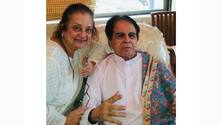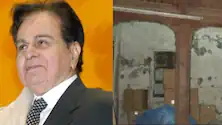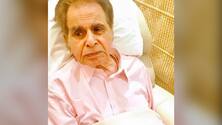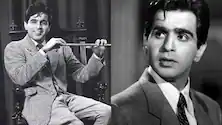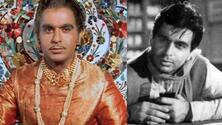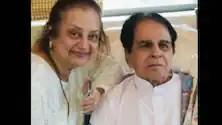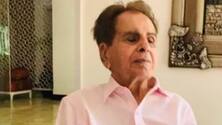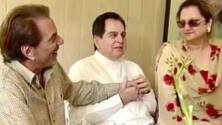Rare and Refined - Dilip Kumar
On December 11, thespian Dilip Kumar turned 86. On this occasion, erstwhile Screen editor and family friend Udaya Tara Nayar gleans nuggets from his forthcoming autobiography that she has compiled. She counts how their friendship flourished over the last four decades, so much so that Dilipsahab has crowned her the world's best idli-maker!.
It
all
began
with
Republic
Day
quotes
S.S.
Pillai,
the
then-editor
of
Screen
sent
me
with
senior
reporter
R
M
Kumtakar
to
get
Dilipsahab's
quotes
on
Republic
Day
for
the
special
issue.
That
was
in
1968
when
I
had
already
put
in
a
year's
active
service
and
I
was
well-groomed
enough
to
meet
superstar
Dilip
Kumar.
As
a
kid
I
had
met
him
many
times
with
dad
but
this
was
our
first
meeting
in
professional
capacity.
He
was
then
preparing
for
a
film
to
be
directed
by
Jabbar
Patel.
He
was
sketching
the
look
of
the
character
he
was
to
play.
He
had
an
easel
in
front
of
him
-
he
had
already
sketched
the
hills
where
the
film
was
to
be
located,
he
had
also
sketched
Saira
Banu's
character
as
a
hillside
belle.
I
watched
him
in
awe.
After
RMK
asked
his
serious
questions
Sahab
asked
me:
"You
little
girl,
now
tell
me
what
do
you
want?" I
promptly
fired
my
questions.
He
answered
me
patiently.
Then
he
started
asking
me
questions
about
Indian
cinema
-
how
much
I
knew
about
Durga
Khote
and
Devika
Rani,
the
films
I
had
watched
and
how
I
would
review
those
if
I
had
to
do
so.
I
answered
his
questions
with
utmost
sincerity
and
in
the
evening
when
Mr
Pillai
called
him
to
talk
about
something
he
told
dad:
"Your
daughter
is
talented.
She
will
go
places."
I
was
so
flattered!
But
my
father
warned
me
that
I
should
concentrate
on
working
hard.
No
fooling
around
on
the
sets
I
met
him
many
times
subsequently
and
he
greeted
me
warmly
partly
because
I
was
Mr
Pillai's
daughter
and
partly
because
he
felt
I
was
serious
about
my
job.
He
remarked
once:
"You
are
toiling
very
hard.
Keep
it
up." I
was
in
the
family
way
and
was
moving
around
in
buses
and
trains,
walking
to
the
studios
etc.
working
relentlessly.
It
was
instant
rapport
with
Saira
Banu
when
I
met
her
on
the
sets
during
the
making
of
Jhuk
Gaya
Aasmaan
which
released
after
their
marriage.
Because
of
Saira,
I
had
a
greater
access
to
their
home
and
was
spending
a
lot
of
time
at
Pali
Hill.
I
discovered
that
Sahab
was
a
very
hardworking
person.
He
never
took
his
profession
lightly.
Always
I
found
him
working
on
dialogue,
script
or
discussing
a
subject
with
the
director
he
was
working
with.
He
introduced
me
to
Tapan
Sinha,
the
director
of
Sagina
Mahato
saying:
"She
is
Mr.
Pillai's
daughter.
But
more
than
that
she
is
a
responsible
journalist."
I
was
so
happy.
I
travelled
with
Sahab
and
Saira
to
Chennai
during
the
making
of
Sudhakar
Bokade's
Izzatdar.
I
was
covering
the
shoot.
Saira
made
sure
I
was
given
the
adjoining
room
and
I
had
the
privilege
of
staying
awake
till
2
a.m.
with
her
while
Sahab
worked
on
dialogues
and
scenes.
The
next
day
despite
the
late
night
he
would
be
charged
and
well
prepared
for
the
shoot
while
his
co-stars
like
Govinda
would
report
late
on
the
sets.
There
was
no
seriousness
on
the
sets
and
it
dismayed
him,
but
on
his
part
he
remained
dedicated
to
his
job.
The
indifference
bugged
him
but
he
never
made
an
issue
of
it,
he
just
got
on
with
his
work.
He
would
ask
the
director
for
the
next
day's
scene
and
the
director
would
fumble
helplessly.
That's
how
the
industry
had
started
functioning
then.
But
he
would
insist
and
they
would
have
to
send
him
his
scenes
on
which
he
would
work
late
in
the
night!
Madhuri
Dixit
was
in
the
female
lead.
Saira
became
fond
of
her
and
Sahab,
too,
would
observe
that
she
was
a
well-brought-up
girl.
His
cook
prepared
feasts
for
the
Saudagar
unit
During
the
Mahabaleshwar
outdoor
shoot
of
Saudagar
(where
I
was
there
for
another
coverage),
director
Subhash
Ghai
and
co-star
Raaj
Kumar
would
also
automatically
get
into
the
mood
to
"work"
when
Sahab
would
arrive.
Sahab
and
Raaj
Kumar
would
talk
in
Punjabi
with
Subhash.
I
recall
one
afternoon
when
the
camera
angles
were
being
discussed
Sahab
told
Subhash
that
the
angle
he
had
in
mind
just
wouldn't
work.
Subhash
insisted
and
so
did
Ashok
Mehta
that
it
would
be
just
right
to
register
the
confrontation
between
Sahab
and
Raaj
Kumar.
Sahab
smiled
and
remained
quiet.
Finally,
when
the
rehearsal
time
arrived,
Sahab
was
proved
right.
Subhash
and
Ashok
Mehta
touched
Sahab's
feet.
There
was
no
fooling
around
for
him
whilst
making
a
film,
he
would
give
his
all
to
the
film.
I
realised
how
different
he
was
from
the
other
actors
-
he
was
so
full
of
dignity,
warmth,
chivalry
and
concern
for
everybody.
He's
a
great
foodie
-
he
loves
home
made
delicacies.
He
took
their
cook
Narmada
to
Mahabaleshwar
so
that
she
could
prepare
feasts
for
the
entire
unit.
So
lunch-time
was
a
big
party
for
everybody.
Young
debutante
Manisha
Koirala
would
sit
with
him
and
he
would
talk
patiently
and
lovingly
to
her
and
put
her
at
ease.
Likewise
newcomer
Vivek
Mushran.
His
fatherly
approach
towards
younger
colleagues
has
endeared
him
to
so
many,
ask
Dharmendra
why
he
loves
Sahab
so
much.
After
I
lost
my
father
I
too
turned
to
him
for
his
valuable
advice
in
personal
and
professional
matters.
From
a
shy
boy
to
a
thespian
Dilipsahab
was
born
in
Peshawar,
Pakistan
and
he
spent
his
early
childhood
there.
He
grew
up
like
any
other
boy
except
that
he
was
painfully
shy.
He
has
loving
memories
of
his
mother
as
he
always
trailed
behind
her
clutching
at
her
dupatta.
After
World
War
II,
his
father
migrated
to
Mumbai
to
set
up
his
fruit
business.
He
remembers
his
house
in
Nagdevi
Street
near
Crawford
Market,
Mumbai,
his
schooling
at
a
British
school
in
Deolali
and
his
first
job
at
an
Army
canteen
in
Pune
very
vividly.
It baffles him no end was he landed up as an actor. Something that continues to mystify him as to how he faced the camera and went on to be an institution in acting!
He watched very few films before joining Bombay Talkies where it was mandatory for him to watch Indian and Hollywood classics. He recalls how Devika Rani asked him: "Why don't you become an actor?" and time stood still for a shy young man who had no idea what acting was.
Reading
inspired
him
in
reel
and
real
life
What
has
helped
him
all
along
in
his
career,
he
says
in
his
autobiography,
is
his
reading
habit.
He
never
had
any
idols.
He
read
books
in
English
and
Urdu.
His
older
brother,
Ayub
Khan,
was
also
an
avid
reader
and
together
they
would
find
new
and
exciting
reading
material.
When
Ayubsahab
was
ill,
Dilipsahab
would
readout
chapters
from
books
to
him.
Ayubsahab's
favourite
author
was
Somerset
Maugham.
His
love
for
story
development
and
plotting
took
root.
In
fact,
he
attributes
his
refinement
and
his
capacity
to
deal
with
life's
complex
situations
to
his
vast
reading
and
the
maturity
it
gave
him.
He lived in a big rented house at Pali Mala, Bandra before buying his bungalow at 48, Pali Hill. He doesn't speak about his personal glories. He is a humble person who hasn't changed over the years and still has the same friends. Even today, Pyarelal, the dhobi who has washed his clothes for years, continues to starch and wash his spotlessly white attire.
I remember visiting him at 48 Pali Hill as a school girl with my dad. There was a huge crowd of fans outside his bungalow. I asked dad "Is something wrong? Why are so many people waiting outside?" Dad told me it was nothing unusual. They were there everyday to see Sahab going out in his car. He became a superstar long before Rajesh Khanna and Amitabh Bachchan arrived.
In those days his tousled hairstyle became a rage but it wasn't a deliberate attempt on his part. His hair was like that and it just caught on. He is a very refined person and he likes to hobnob with highly-educated professionals and always dresses like a gentleman. It has a lot to do with his fine character and his family background. He is what he is. I feel, in terms of refinement and stature, that the most worthy successor to his legacy is Amitabh Bachchan .
Hits
and
heroines
Dilipsahab
does
not
give
any
special
place
to
any
of
his
films.
From
Mughal-E-Azam
and
Ganga
Jamuna
to
Naya
Daur
he
speaks
about
his
films
in
a
very
special
manner.
He
was
passionate
about
every
film
he
featured
in.
Sahab
chose
his
films
carefully
and
selected
scripts
that
were
suitable
to
which
he
could
give
a
dimension
of
his
own.
Dilipsahab refers to some of his heroines in his autobiography in his own gentlemanly way. It is a refined and forthright account of his life and times. He does not play to the gallery. He never has. The book is a reflection of the refined man he is - sans vulgar remarks and lurid anecdotes. One of his fans, Vijaybhai, a textile business man, has a roomful of pictures and magazines featuring Dilipsahab and he has volunteered rare pictures for the book . It's the only book wherein his life he talks about from the day he was born, his childhood, his boyhood, his family members.
Made
for
each
other
He
speaks
about
Saira
with
the
respect,
love
and
admiration
she
deserves.
"I
am
grateful
to
God
I
married
Saira!,"
he
says.
Indeed,
nobody
can
look
after
him
like
she
does
-
Saira
is
protective
like
a
mother,
possessive
like
a
wife
and
admires
him
like
a
most
zealous
fan.
Once,
after
an
argument
with
him
when
Saira
walked
away
in
a
huff,
Sahab
told
me
to
put
on
a
DVD
of
one
of
his
films
-
when
she
heard
the
dialogues
she
came
quickly
before
the
TV
and
went
running
to
him
and
embraced
him
saying,
"How
can
I
be
angry
with
you?"
She
is
still
head
over
heels
in
love
with
him.
They
are
made
for
each
other.
Their
philosophies
match
-
they
are
both
great
human
beings
and
citizens.
They
support
50-55
needy
families
of
all
faiths
in
Mumbai
by
providing
them
with
food,
clothes
and
medicines.
They
also
provide
medical
and
educational
assistance
to
the
needy.
Their
charity
work
is
conducted
quietly.
Agile
mind
and
sound
health
Contrary
to
rumours,
Dilipsahab
is
healthy
in
mind
and
body.
His
memory
is
still
very
sharp
-
he
quotes
passages
from
English
classics
and
Urdu
poetry.
There
is
no
serious
problem
with
his
health.
But
he
doesn't
want
to
work
in
films,
I
feel,
because
the
scenario
has
changed
so
much
-
he
cannot
sit
there
waiting
for
stars
to
turn
up.
Can
he?
Also
who's
there
to
write
a
role
for
him?
Subhash
Ghai
and
Rajkumar
Santoshi
still
want
to
make
films
with
him.
If
there
is
some
wonderful
role
and
right
set-up
-
maybe
he
will
act
again!
Sahab liked Jodhaa Akbar, Munnabhai MBBS and Black that he watched at special screenings. He does not watch movies on TV and prefers watching Sports channels. These days Saira's serial, Stree Teri Kahani for DD, which has high TRPs is being shot at their bungalow and Sahab often comes down quietly to watch the proceedings and makes relevant suggestions.




 Click it and Unblock the Notifications
Click it and Unblock the Notifications





